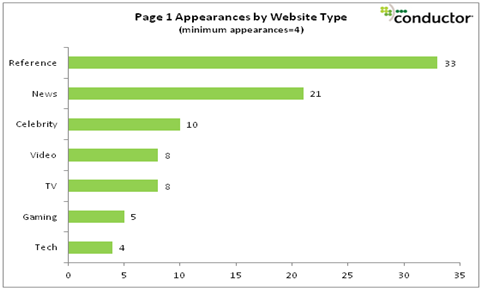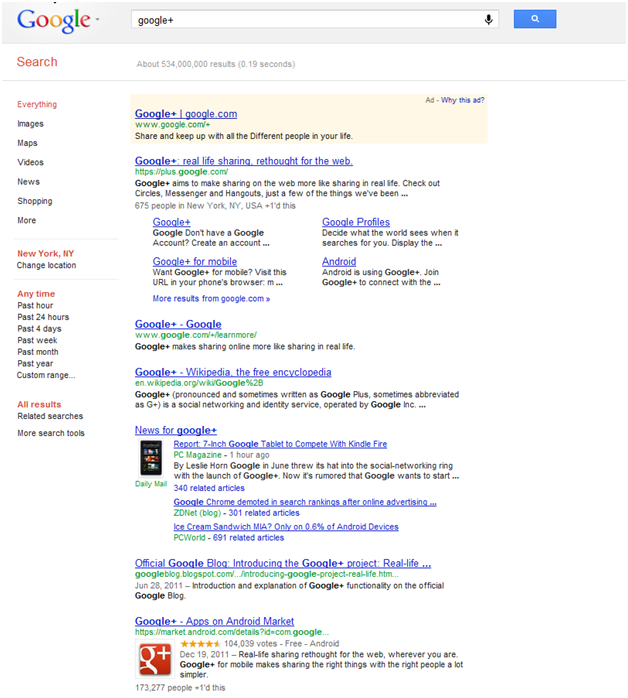How America’s Search Trends From 2011 Makes Google+ Stand Out
More than 300 Billion searches were made in the US in 2011, according to ComScore. In December each year, the Big Three search engines publish the most popular searches of the year. In 2011, the top ten searches from the three search engines added up to more than 250 million searches alone. We thought it […]
More than 300 Billion searches were made in the US in 2011, according to ComScore. In December each year, the Big Three search engines publish the most popular searches of the year.
In 2011, the top ten searches from the three search engines added up to more than 250 million searches alone. We thought it would be fun to take a look at what America sees in the search results for the most popular searches of the year.
First, the top ten US Searches in 2011 by search engine:
|
|
Yahoo |
Bing |
| Rebecca Black | iPhone | Person: Justin Bieber |
| Google + | Casey Anthony | News story: Casey Anthony trial |
| Ryan Dunn | Kim Kardashian | Athlete: Maria Sharapova |
| Casey Anthony | Katy Perry | Musician: Justin Bieber |
| Battlefield 3 | Jennifer Lopez | Electronics: Xbox |
| iPhone 5 | Lindsay Lohan | TV show: “American Idol” |
| Adele | American Idol | Reality star: Kim Kardashian |
| Tepco (IN JAPANESE) | Jennifer Aniston | Late night show: Chelsea Handler |
| Steve Jobs | Japan earthquake | Movie: “Mission Impossible: Ghost Protocol” |
| iPad 2 | Osama bin Laden | Celebrity event: Royal wedding |
America Likes Its Celebrities
When we group Google and Yahoo’s top searches by type of search, we see America is obsessed with celebrities. We are about half as enamored with technology, while giving far less attention to actual world events. (What does that say about the world we will be leaving our children? :-) )
What Americans Saw In the SERPs
So what did searchers actually see in the search results for the most searched terms in 2011? In late December 2011, we tracked the top keywords within each search engine in Searchlight, Conductor’s SEO Platform.
A few things to be aware of before we dive into the results:
Differing Definitions of ‘Top Searches’
Google describes its top searches list as ‘the year’s 10 fastest-rising global queries’, while Yahoo describes theirs as the ‘Top 10 Searches’ of 2011. Bing doesn’t publish top their 10 overall searches, but do publish the top searches in each category, so the top query in each category was used.
Timeliness of Searches
Many of the queries are, of course, timely and took place over the course of the year (e.g. ‘Casey Anthony trial’). Results were extracted from Searchlight in late December 2011 so there may have been some minor shift in the search results for some queries since those events took place earlier in the year.
Wikipedia & YouTube Appear Most Often On Page 1-3
To determine the domains searchers were seeing most frequently, we added the instances a domain appeared on page 1-3 of the search results for the top queries.
With its content-rich website and authoritative domain, Wikipedia had the most appearances, with 41 search results on page one to three, 58 percent more than second place YouTube.
SEO factory Huffington Post had the third most frequent appearances, the most of any news site. Reflecting the skew amongst the top searches of celebrities, gossip and Hollywood-centric sites such as perezhilton.com, people .com and tmz.com had strong showings as well.
Note:
-The following subdomains were rolled up into yahoo.com: news.yahoo.com, omg.yahoo.com, tv.yahoo.com, movies.yahoo.com, finance.yahoo.com, voices.yahoo.com, music.yahoo.com
-The following subdomains were rolled into go.com: abcnews.go.com, and espn.go.com
(90% of appearances were abcnews.go.com)
Page One Appearances
Looking at appearances only on page one, however, tells us our analysis of page one to three results gave us only part of the story (page one is where 95% of clicks occur).
Comparing appearances by domain for page one versus appearances for page one through three tells us:
Top Domains Appear Multiple Times in the Search Results:
As if it’s not hard enough to outrank Wikipedia and YouTube only on page one, the comparison shows they have multiple appearances in the search pages, often appearing a second time on page 2-3 for the same query.
Social Networks Often on Page 2-3
Social networks such as Twitter, Facebook, and yes, even MySpace, are in the middle of the pack in appearances when we group by page 2-3, but do not appear on our list when grouping by page one only (they have less than 4 appearances on page one each.) This means they appear in the search results for the top queries of 2011, but most often on page 2-3.
Celebrity Sites
Although celebrity gossip sites had a significant number of appearances on page 1-3, only a handful actually appeared on page 1. Perezhilton.com, for example, had 17 appearances on page 1-3, but only three were on page 1.
Types Of Domains Appearing On Page One
So, what kinds of websites did Americans see most frequently in the 2011 search engine pages?
Reference sites appeared most often, led by Wikipedia’s strong showing, but also included multiple appearances from sites such as answers.com and imdb.com.
News sites appeared second most frequently, followed by celebrity sites. Retailers were notably absent from the search pages for America’s most popular searches of 2011 due to the non-purchase nature of the queries.
(Draw your own conclusions about what the frequency of the appearance of reference/news sites might mean in regards to Google’s renewed focus on content quality.)
‘Google +’ Stands Out
In reviewing the results for the top searches, one particular search stood out from the others on Google’s list (sung to the tune ‘which one of these is not like the others…?’)
Google’s Fastest Growing Searches 2011:
- Rebecca Black
- Google +
- Ryan Dunn
- Casey Anthony
- Battlefield 3
- iPhone 5
- Adele
- Tepco (Japanese)
- Steve Jobs
- iPad 2
Depending on who is writing the headline, the tech media has categorized Google + as a catastrophic failure or a stunning success experiencing hyper subscriber growth. Either way, its presence on the list calls for further investigation.
Google + Searches Spiked At Launch Followed By Dropoff
According to Google Trends, searches for ‘Google +’ and ‘Google+’ spiked at ‘invite’ launch in June, then again in October at the full public launch, before flattening out in the latter quarter of the year.
Notice that searches for ‘Google+’ (without a space) are a ‘1.00’ on Google’s search volume index, while searches for ‘Google +’ (with a space) are a ‘.40’. This suggests searches for ‘Google+’ are approximately 40 percent that of ‘Google +’, which means a significant portion of users are looking for Google’s social network with searches for ‘Google +’.
Notice too that Google does not show relevant news articles explaining the search trends for ‘Google +’ as it does for ‘Google+’.
More on both later.
Contextualizing The Google + Discrepancy
Now for some context around the total search volume trends for ‘Google +’, the second fastest growing search on Google’s list, relative to the other searches on the list.
Here are searches for both variations of ‘Google +’ when plotted against ‘iphone 5’, Google’s sixth fastest-rising global query:
Here they are when plotted against ‘Facebook’:
To be fair, Google does characterize their list as the fastest growing searches of 2011 and not the highest volume searches, but understanding the context of the total number of searches is important when considering the big picture of search trends.
The extent to which the search trends for Google + decline from initial spikes at launch compared to some of our comparison queries is enough to make us go ‘hmmm’ as to their inclusion.
Google + Invisible For ‘Google +’
Remember ‘Google +’ versus ‘Google+’?
As we pointed out previously, according to Google Trends, ‘Google +’ has 40 percent of the searches of ‘Google+’ — a non–trivial percentage of searchers who are looking for Google’s social network with the query ‘Google +’.
The SERP for ‘Google+’ is filled with relevant results, with links to the Google + sign-up page, Wikipedia entry, launch announcement, and news articles about the service:
The SERP for ‘Google +’, however, does not have a single result pertaining to Google +, presumably because Google sees the query ‘Google +’ as a search for ‘Google’ (which also explains the lack of news articles for the query in Google Trends.)
Oops.
Here are the results that appear in the SERP, with a description of the Google site that is showing for each of the search results, none of which contain info about the Google + service.
| Position | URL | Website |
| 1 | https://www.google.com | Google Homepage |
| 2 | https://maps.google.com | Google Maps |
| 3 | https://www.google.com/videohp | Google Videos |
| 4 | https://earth.google.com | Google Earth |
| 5 | https://translate.google.com | Google Translate |
| 6 | https://www.google.com/reader | Google Reader |
| 7 | https://www.google.org | Google Org |
| 8 | https://googledesktop.blogspot.com | Google Desktop |
| 9 | https://twitter.com/GOOGLE | Google’s official Twitter account |
| 10 | https://googleblog.blogspot.com | Google’s Blog |
Some would argue Google should do something about ensuring searchers see relevant results for what is clearly an attempt to find their social network. Others would say they should, er, ‘maintain the integrity of their search algorithm’.
If the algorithm inherently interprets a query a particular way then that is the way it should be presented to the user regardless of what the search is for. Personally, I think they should do what is best for the searcher. In this case, that means returning results for what they are looking for.
Either way, you choose to interpret the algorithm or its intentions, a Google + search result is nowhere to be found for what is sure to be a significant number of searches for Google’s flagship social network they have been working hard to promote.
What do you think? Should Google show Google + search results for the query ‘Google +’
Sound off in the comments below.
Opinions expressed in this article are those of the guest author and not necessarily Search Engine Land. Staff authors are listed here.
Related stories








